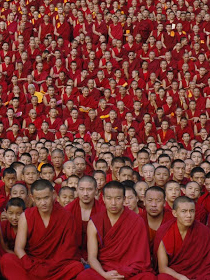- Home
- FPMT Homepage
Foundation for the Preservation of the Mahayana Tradition
The FPMT is an organization devoted to preserving and spreading Mahayana Buddhism worldwide by creating opportunities to listen, reflect, meditate, practice and actualize the unmistaken teachings of the Buddha and based on that experience spreading the Dharma to sentient beings. We provide integrated education through which people’s minds and hearts can be transformed into their highest potential for the benefit of others, inspired by an attitude of universal responsibility and service. We are committed to creating harmonious environments and helping all beings develop their full potential of infinite wisdom and compassion. Our organization is based on the Buddhist tradition of Lama Tsongkhapa of Tibet as taught to us by our founders Lama Thubten Yeshe and Lama Thubten Zopa Rinpoche.
- Willkommen
Die Stiftung zur Erhaltung der Mahayana Tradition (FPMT) ist eine Organisation, die sich weltweit für die Erhaltung und Verbreitung des Mahayana-Buddhismus einsetzt, indem sie Möglichkeiten schafft, den makellosen Lehren des Buddha zuzuhören, über sie zur reflektieren und zu meditieren und auf der Grundlage dieser Erfahrung das Dharma unter den Lebewesen zu verbreiten.
Wir bieten integrierte Schulungswege an, durch denen der Geist und das Herz der Menschen in ihr höchstes Potential verwandelt werden zum Wohl der anderen – inspiriert durch eine Haltung der universellen Verantwortung und dem Wunsch zu dienen. Wir haben uns verpflichtet, harmonische Umgebungen zu schaffen und allen Wesen zu helfen, ihr volles Potenzial unendlicher Weisheit und grenzenlosen Mitgefühls zu verwirklichen.
Unsere Organisation basiert auf der buddhistischen Tradition von Lama Tsongkhapa von Tibet, so wie sie uns von unseren Gründern Lama Thubten Yeshe und Lama Thubten Zopa Rinpoche gelehrt wird.
- Bienvenidos
La Fundación para la preservación de la tradición Mahayana (FPMT) es una organización que se dedica a preservar y difundir el budismo Mahayana en todo el mundo, creando oportunidades para escuchar, reflexionar, meditar, practicar y actualizar las enseñanzas inconfundibles de Buda y en base a esa experiencia difundir el Dharma a los seres.
Proporcionamos una educación integrada a través de la cual las mentes y los corazones de las personas se pueden transformar en su mayor potencial para el beneficio de los demás, inspirados por una actitud de responsabilidad y servicio universales. Estamos comprometidos a crear ambientes armoniosos y ayudar a todos los seres a desarrollar todo su potencial de infinita sabiduría y compasión.
Nuestra organización se basa en la tradición budista de Lama Tsongkhapa del Tíbet como nos lo enseñaron nuestros fundadores Lama Thubten Yeshe y Lama Zopa Rinpoche.
A continuación puede ver una lista de los centros y sus páginas web en su lengua preferida.
- Bienvenue
L’organisation de la FPMT a pour vocation la préservation et la diffusion du bouddhisme du mahayana dans le monde entier. Elle offre l’opportunité d’écouter, de réfléchir, de méditer, de pratiquer et de réaliser les enseignements excellents du Bouddha, pour ensuite transmettre le Dharma à tous les êtres. Nous proposons une formation intégrée grâce à laquelle le cœur et l’esprit de chacun peuvent accomplir leur potentiel le plus élevé pour le bien d’autrui, inspirés par le sens du service et une responsabilité universelle. Nous nous engageons à créer un environnement harmonieux et à aider tous les êtres à épanouir leur potentiel illimité de compassion et de sagesse. Notre organisation s’appuie sur la tradition guéloukpa de Lama Tsongkhapa du Tibet, telle qu’elle a été enseignée par nos fondateurs Lama Thoubtèn Yéshé et Lama Zopa Rinpoché.
Visitez le site de notre Editions Mahayana pour les traductions, conseils et nouvelles du Bureau international en français.
Voici une liste de centres et de leurs sites dans votre langue préférée
- Benvenuto
L’FPMT è un organizzazione il cui scopo è preservare e diffondere il Buddhismo Mahayana nel mondo, creando occasioni di ascolto, riflessione, meditazione e pratica dei perfetti insegnamenti del Buddha, al fine di attualizzare e diffondere il Dharma fra tutti gli esseri senzienti.
Offriamo un’educazione integrata, che può trasformare la mente e i cuori delle persone nel loro massimo potenziale, per il beneficio di tutti gli esseri, ispirati da un’attitudine di responsabilità universale e di servizio.
Il nostro obiettivo è quello di creare contesti armoniosi e aiutare tutti gli esseri a sviluppare in modo completo le proprie potenzialità di infinita saggezza e compassione.
La nostra organizzazione si basa sulla tradizione buddhista di Lama Tsongkhapa del Tibet, così come ci è stata insegnata dai nostri fondatori Lama Thubten Yeshe e Lama Zopa Rinpoche.
Di seguito potete trovare un elenco dei centri e dei loro siti nella lingua da voi prescelta.
- 欢迎 / 歡迎
简体中文
“护持大乘法脉基金会”( 英文简称:FPMT。全名:Foundation for the Preservation of the Mahayana Tradition) 是一个致力于护持和弘扬大乘佛法的国际佛教组织。我们提供听闻,思维,禅修,修行和实证佛陀无误教法的机会,以便让一切众生都能够享受佛法的指引和滋润。
我们全力创造和谐融洽的环境, 为人们提供解行并重的完整佛法教育,以便启发内在的环宇悲心及责任心,并开发内心所蕴藏的巨大潜能 — 无限的智慧与悲心 — 以便利益和服务一切有情。
FPMT的创办人是图腾耶喜喇嘛和喇嘛梭巴仁波切。我们所修习的是由两位上师所教导的,西藏喀巴大师的佛法传承。
繁體中文
護持大乘法脈基金會”( 英文簡稱:FPMT。全名:Found
ation for the Preservation of the Mahayana Tradition ) 是一個致力於護持和弘揚大乘佛法的國際佛教組織。我們提供聽聞, 思維,禪修,修行和實證佛陀無誤教法的機會,以便讓一切眾生都能 夠享受佛法的指引和滋潤。 我們全力創造和諧融洽的環境,
為人們提供解行並重的完整佛法教育,以便啟發內在的環宇悲心及責 任心,並開發內心所蘊藏的巨大潛能 — 無限的智慧與悲心 – – 以便利益和服務一切有情。 FPMT的創辦人是圖騰耶喜喇嘛和喇嘛梭巴仁波切。
我們所修習的是由兩位上師所教導的,西藏喀巴大師的佛法傳承。 察看道场信息:
- FPMT Homepage
- News/Media
-
- Study & Practice
-
-
- About FPMT Education Services
- Latest News
- Programs
- New to Buddhism?
- Buddhist Mind Science: Activating Your Potential
- Heart Advice for Death and Dying
- Discovering Buddhism
- Living in the Path
- Exploring Buddhism
- FPMT Basic Program
- FPMT Masters Program
- FPMT In-Depth Meditation Training
- Maitripa College
- Lotsawa Rinchen Zangpo Translator Program
- Universal Education for Compassion & Wisdom
- Online Learning Center
-
- Prayers & Practice Materials
- Overview of Prayers & Practices
- Full Catalogue of Prayers & Practice Materials
- Explore Popular Topics
- Benefiting Animals
- Chenrezig Resources
- Death & Dying Resources
- Lama Chopa (Guru Puja)
- Lama Zopa Rinpoche: Compendium of Precious Instructions
- Lama Zopa Rinpoche: Life Practice Advice
- Lama Zopa Rinpoche Practice Series
- Lamrim Resources
- Mantras
- Prayer Book Updates
- Purification Practices
- Sutras
- Thought Transformation (Lojong)
- Audio Materials
- Dharma Dates - Tibetan Calendar
- Translation Services
- Publishing Services
- Ways to Offer Support
- Prayers & Practice Materials
-
- Teachings and Advice
- Find Teachings and Advice
- Lama Zopa Rinpoche Advice Page
- Lama Zopa Rinpoche: Compendium of Precious Instructions
- Lama Zopa Rinpoche Video Teachings
- ༧སྐྱབས་རྗེ་བཟོད་པ་རིན་པོ་ཆེ་མཆོག་ནས་སྩལ་བའི་བཀའ་སློབ་བརྙན་འཕྲིན།
- Podcasts
- Lama Yeshe Wisdom Archive
- Buddhism FAQ
- Dharma for Young People
- Resources on Holy Objects
- Teachings and Advice
-
-
*If a menu item has a submenu clicking once will expand the menu clicking twice will open the page.
-
-
- Centers
-
- Teachers
-
- Projects
-
-
-
-
*If a menu item has a submenu clicking once will expand the menu clicking twice will open the page.
-
-
- FPMT
-
-
-
-
-
Real happiness in life starts when you begin to cherish others.
Lama Zopa Rinpoche
-
-
-
- Shop
-
-
-
The Foundation Store is FPMT’s online shop and features a vast selection of Buddhist study and practice materials written or recommended by our lineage gurus. These items include homestudy programs, prayers and practices in PDF or eBook format, materials for children, and other resources to support practitioners.
Items displayed in the shop are made available for Dharma practice and educational purposes, and never for the purpose of profiting from their sale. Please read FPMT Foundation Store Policy Regarding Dharma Items for more information.
-
-
Advice from Lama Zopa Rinpoche
6
Don’t Think Taking Refuge Is Something Easy
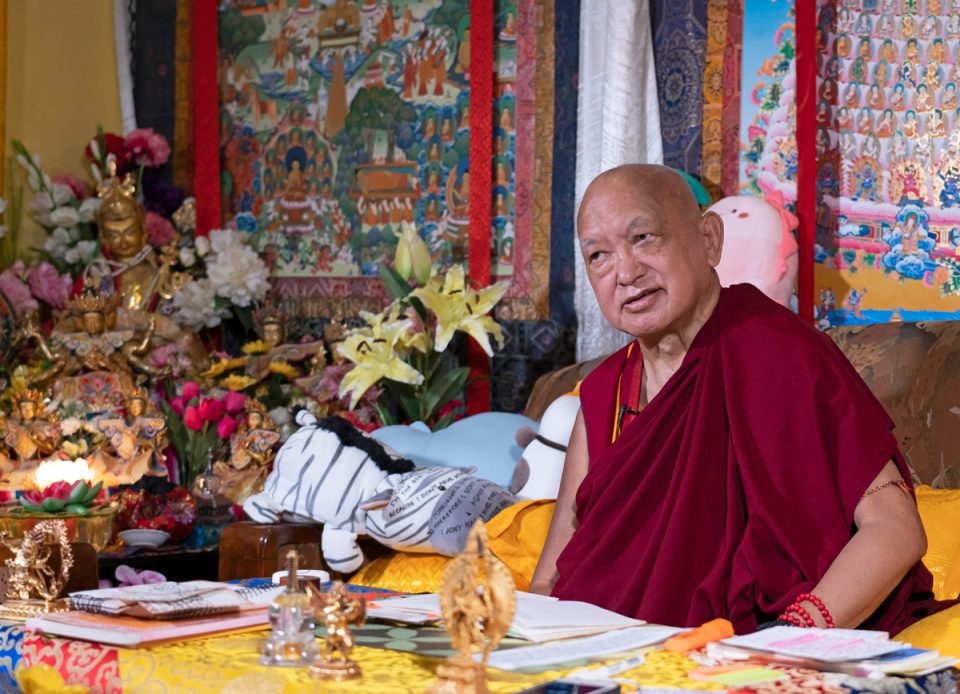
Lama Zopa Rinpoche giving a video teaching at Kopan Monastery, Nepal, September 2021. Photo by Ven. Lobsang Sherab.
Lama Zopa Rinpoche continues his video teachings on thought transformation from Kopan Monastery in Nepal. Here is a summary of the most recent teaching:
Rinpoche continues discussing refuge in this new video. Rinpoche begins by reminding us that we must be careful about the objects in which we take refuge—for example, people take refuge in animals, nature, or spirits.
To make the point of why it is best to go for refuge to Buddha, Rinpoche again discusses the four qualities of a Buddha and shares stories and commentary after each.
- Buddha is free from suffering and the cause of suffering
- Buddha is expert in the methods to free others from suffering
- Buddha has no discriminating thought and has equal compassion and care for all
- Buddha works to benefit every sentient being whether they benefit him or not
Worldly gods and spirits don’t have the four qualities of the Buddha.
Before you take refuge in things like food, drink, medicine, and clothes, you always check up on the quality. For example, you don’t buy food that has gone bad; you check it first before buying. Like this, you also have to check the quality of the one in whom you are going to take ultimate refuge. When you are dying, in order to not be born in the lower realms, to purify negative karma, to obtain a higher rebirth, Rinpoche says emphatically, “Rely on Buddha!” To free you from samsara, to achieve nirvana, ultimate happiness forever—”Rely on Buddha!” Buddha has all the power and qualities to guide you. If you take refuge in worldly beings, samsaric beings who have discriminating thoughts, no compassion for sentient beings, attachment, anger, ignorance, self-cherishing—how can they help you?
Rinpoche then shares several stories about the dangers of trusting worldly spirits, particularly in relation to the spirit Dolgyal (Shugden).
Things appear to us according to our karma. You see things as pure or impure based on how pure or impure your own mind is. For example, one container filled with liquid appears to a preta as pus, to a human as water, and to worldly gods, suras, and asuras as nectar. To Buddha’s attendant, who served him for twenty-two years, Buddha appeared to be a liar; he didn’t see Buddha as Buddha. Rinpoche explains that was due to his karma. Likewise, some lamas have showed the aspect of practicing Dolgyal, but didn’t actually do the practice. There are many examples of enlightened beings who showed the aspect of being ordinary. What we see in others is due to our own karma.
Rinpoche shares a verse from the Fifth Dalai Lama:
In the view of your own perverted mind,
Your own mistakes appear in the guru’s actions.
Your heart is totally rotten from the depths.
Recognizing that it is your own mistake, abandon it like poison.
Rinpoche advises that this is very, very powerful, and it is so important to do mindfulness practice in relation to guru yoga. Then you never give rise to heresy and anger. If you see any mistake in the guru, it is a reflection of your ordinary mind’s mistake. Don’t think that taking refuge is something easy. Monks and nuns study refuge and the qualities of Buddha, Dharma, and Sangha their whole lives so they can learn the meaning of the words and actualize them to achieve enlightenment by completing the qualities of Buddha, Dharma, and Sangha. This is not easy! You take refuge to be free from samsara. In order to do that, you have to know what samsara is.
We invite you to go deeper into the topics presented here, plus many others, by watching Rinpoche’s video and reading the full transcript of Rinpoche’s teaching.
Watch Lama Zopa Rinpoche’s teaching “Don’t Think Taking Refuge Is Something Easy”:
- Read the transcript of Rinpoche’s teaching
- Find Rinpoche’s Teachings on Thought Transformation translated into Spanish, Italian, French, Chinese, and Russian
- The Foundation Store offers many resources for your practice of refuge.
- Dedication verses
Watch more from the video series Lama Zopa Rinpoche’s Teachings on Thought Transformation and find links to videos in transcripts, MP3s, additional practice advice, and more:
https://fpmt.org/fpmt/announcements/resources-for-coronavirus-pandemic/advice-from-lama-zopa-rinpoche-for-coronavirus/
Lama Zopa Rinpoche is the spiritual director of the Foundation for the Preservation of Mahayana Tradition (FPMT), a Tibetan Buddhist organization dedicated to the transmission of the Mahayana Buddhist tradition and values worldwide through teaching, meditation and community service.
- Tagged: advice from lama zopa rinpoche, coronavirus, lama zopa rinpoche thought transformation video teaching, refuge, video
4
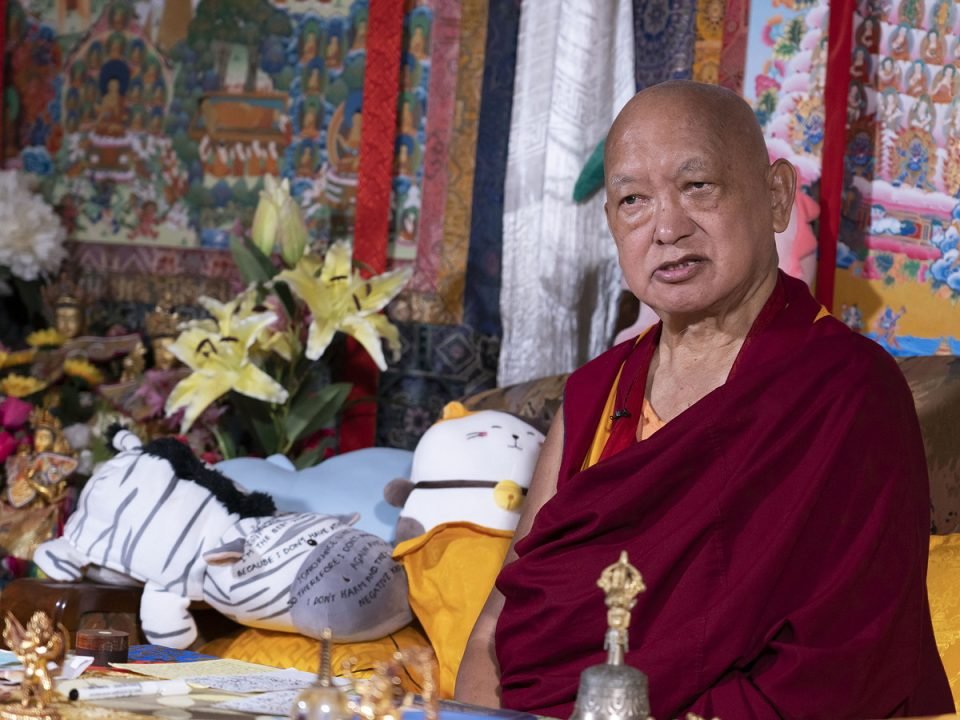
Lama Zopa Rinpoche giving a video teaching at Kopan Monastery, Nepal, September 2021. Photo by Ven. Lobsang Sherab.
Lama Zopa Rinpoche continues his video teachings on thought transformation from Kopan Monastery in Nepal. Here is a summary of the most recent teaching:
Lama Zopa Rinpoche begins this teaching explaining that it is very wise to take refuge while we have the opportunity as human beings. We may only have our human body this one time; it’s like a stone falling up, rather than down. It’s an impossible thing, but it has happened, and we must take full advantage of it to create merit and purify negativities while we can.
People take refuge in all kinds of things—trees, animals, rocks, the sun. The most wise and important refuge to take is in Buddha, Dharma, and Sangha. This is the way to wake up from the deep sleep of ignorance. Not just ignorance from birth in this life, but from ignorance from beginningless samsaric rebirths. Rinpoche implores us to, “Wake up!” If you are reborn in the lower realms, it is difficult to take refuge in Buddha, Dharma, and Sangha. So we have this incredible opportunity right now to do so before it is too late.
Rinpoche outlines and offers commentary on four reasons why Buddha can definitely guide you:
- The Buddha Is Free from Suffering and the Cause of Suffering
- Buddha Is Expert in the Methods to Free Others from Suffering
- Buddha Has No Discriminating Thought and Has Equal Compassion for All
- Buddha Works to Benefit All Sentient Beings Whether They Benefit Him or Not
There are many reasons to take refuge in Buddha, Dharma, and Sangha. It causes you to abandon the self-cherishing thought, which harms you and all sentient beings. The self-cherishing thought causes all the sufferings, obstacles, misfortunes, and problems. If you cherish yourself, the I, then you let go of others, you give up on others. That itself harms them. The nature of that mind is to harm others, to cause suffering, not to benefit them.
You cannot abandon suffering without giving up the I. From Shantideva’s Bodhicharyavatara (chapter 8, verses 135-6):
If you don’t let go of the fire [in your hand],
The burning cannot be stopped.
Like that, if you don’t give up the I,
Suffering cannot be abandoned.
Therefore, in order to pacify
Harm to yourself and others’ suffering,
Give up yourself for others
And cherish others as yourself.
Cherish others most—this is the nature of bodhichitta. Then, you become a bodhisattva. Before that, you should have a realization of renunciation, of how your samsara is totally in the nature of suffering. A bodhisattva cherishes every single sentient being as most precious. Numberless bodhisattvas cherish the most insignificant among us like this, even a mosquito biting and buzzing. For a bodhisattva, each sentient being is most kind and more precious than wish-granting jewels filling the whole sky.
Shakyamuni Buddha cherishes each and every sentient being as most precious. In his lifetimes, he practiced morality. He practiced charity by giving away his limbs and body countless times. He practiced patience for sentient beings, even the difficult ones. He practiced with so much hardship. Numberless buddhas cherish even one mosquito or ant as most precious, Rinpoche explains. Therefore, Buddha definitely guides you, especially if you go for refuge to Buddha.
We invite you to go deeper into the topics presented here, plus many others, by watching Rinpoche’s video and reading the full transcript of Rinpoche’s teaching.
Watch Lama Zopa Rinpoche’s teaching “If You Go for Refuge to Buddha, Buddha Definitely Guides You”:
- Read the transcript of Rinpoche’s teaching.
- Find Rinpoche’s Teachings on Thought Transformation translated into Spanish, Italian, French, Chinese, and Russian.
- Dedication verses
Resources for your Refuge Practice
Taking Refuge and Generating Bodhicitta
The Lama Yeshe Wisdom Archive shared Lama Zopa Rinpoche’s recommended meditation to do when reciting this prayer.
Sang gyä chhö dang tshog kyi chhog nam la
Jang chhub bar du dag ni kyab su chhi
Dag gi jin sog gyi päi tshog nam kyi
Dro la phän chhir sang gyä drub par shog
I take refuge until I am enlightened
In the Buddha, the Dharma, and the Supreme Assembly.
By my merits of generosity and so forth,
May I become a buddha to benefit transmigratory beings.
From FPMT Education Services’ Daily Prayers.
Additional Resources
- Lama Zopa Rinpoche’s advice booklet, How to Take Refuge in the Three Rare Sublime Ones as a Preliminary Practice, edited by Ven. Robina Courtin, is available as a PDF.
- A Daily Meditation on Shakyamuni Buddha by Lama Zopa Rinpoche offers an extensive explanation of the visualizations to be done while taking refuge.
- Lama Yeshe gave the teaching, Refuge is a State of Mind, at a refuge ceremony held at Chenrezig Institute, AUS, in 1979.
-
The FPMT Education program Discovering Buddhism contains a module called, “Refuge in the Three Jewels” and the Living in the Path program contains a module called, “The Refuge and Bodhicitta Verse.”
Watch more from the video series Lama Zopa Rinpoche’s Teachings on Thought Transformation and find links to videos in transcripts, MP3s, additional practice advice, and more:
https://fpmt.org/fpmt/announcements/resources-for-coronavirus-pandemic/advice-from-lama-zopa-rinpoche-for-coronavirus/
Lama Zopa Rinpoche is the spiritual director of the Foundation for the Preservation of Mahayana Tradition (FPMT), a Tibetan Buddhist organization dedicated to the transmission of the Mahayana Buddhist tradition and values worldwide through teaching, meditation and community service.
- Tagged: advice from lama zopa rinpoche, coronavirus, lama zopa rinpoche thought transformation video teaching, refuge, video
1
Making Offerings to Boudha Stupa
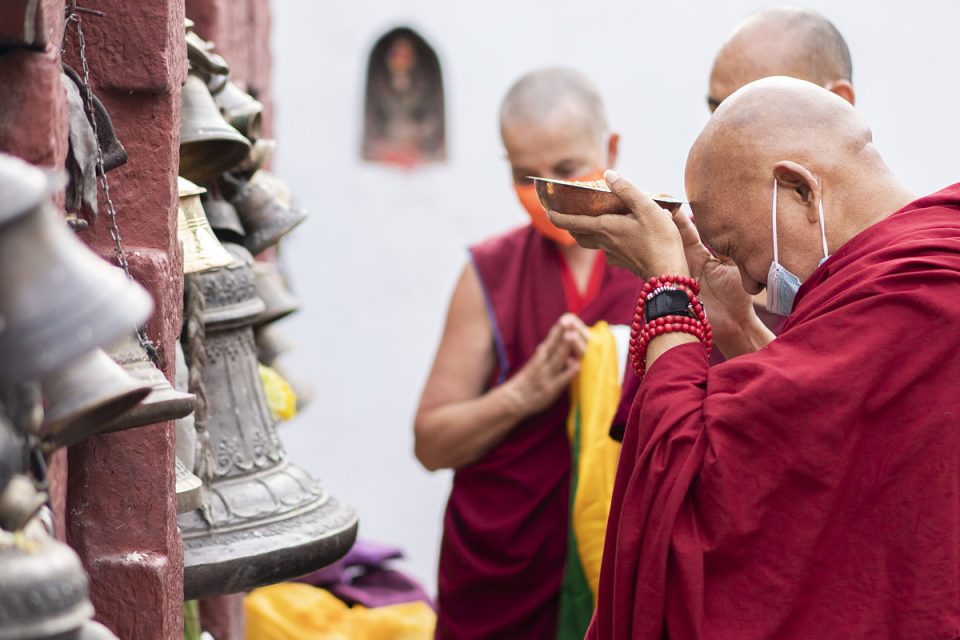
Rinpoche making offerings at Boudha Stupa, Nepal, July 2021. Photo by Ven. Lobsang Sherab.
Lama Zopa Rinpoche continues his video teachings on thought transformation from Kopan Monastery in Nepal. Here is a summary of the most recent teaching:
At the beginning of this video, Rinpoche talks about doing a tsog offering practice at Boudha Stupa and the benefits of making offerings to stupas. He explains how offering tsog to stupas makes you achieve all the realizations; offering medicine to stupas stops diseases; and offering grains to stupas stops famine in the world. Rinpoche also discusses how important it is to consecrate stupas, including the benefit of eliminating war.
From his room at Kopan Monastery, Rinpoche then leads an offering practice to Boudha Stupa accompanied by many senior Sangha members. You can follow along with the offering practice by watching the video (beginning at 6:43) and reading the transcript, which includes the text of the practice.
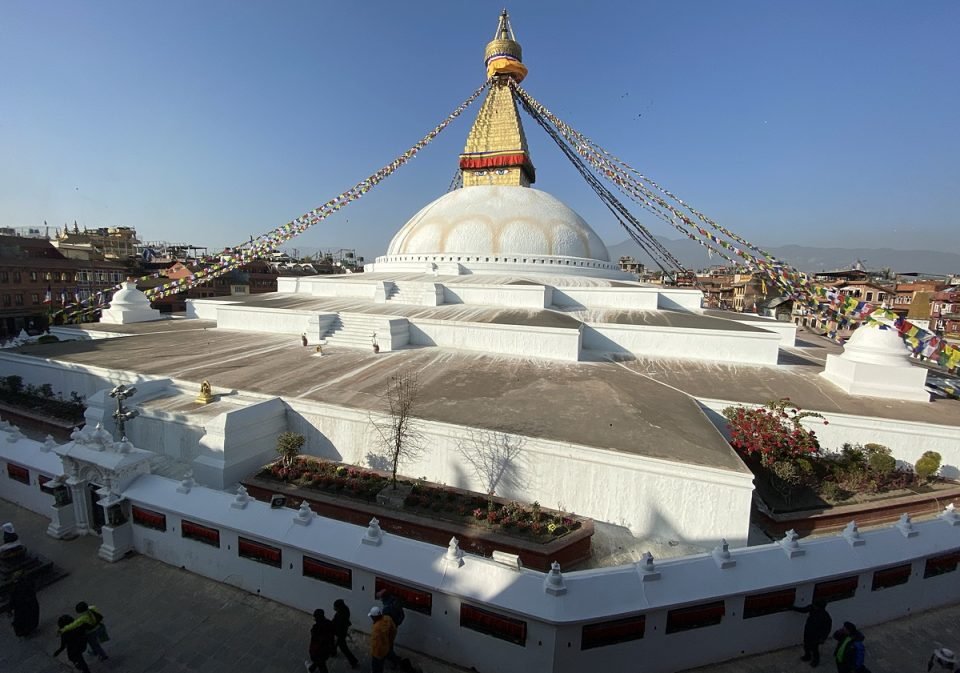
Boudha Stupa, Nepal, February 2021. Photo by Ven. Roger Kunsang.
Rinpoche also provides commentary on verses from Liberation Upon Hearing: The History of the Great Jarung Kashar Stupa by Padmasambhava on the benefits of making offerings to Boudha Stupa, which include the following:
Making requests to the stupa
Whoever supplicates it will spontaneously accomplish the benefit of self and others.
The benefits of offering water
Whoever offers drinking water to it will be born free of thirst and disease.
The benefits of offering flowers
Whoever offers flowers will completely attain the freedoms and advantages.
The benefits of offering light
Whoever offers butter lamps will see the manifest faces of the buddhas and bodhisattvas of the ten directions.
Whoever offers grain oil lamps will be clarified of all obscurations of ignorance.
Whoever offers the fire for butter lamps will radiate the light rays of the Dharma throughout the ten directions.
The benefits of offering perfume
Whoever offers scented water will be freed from depression and all suffering.
The benefits of offering food and drink
Whoever offers food and drink will be sustained by the sustenance of samādhi.
The benefits of offering music
Whoever offers music will proclaim the melodious sound of Dharma throughout the ten directions.
Whoever offers cymbals will attain profound and perfect courage.
Whoever offers bells large and small will attain clear and melodious speech, and the voice of Brahmā.
The benefits of offering the five precious jewels (pearls, turquoise, lapis lazuli, gold, coral)
Whoever offers maṇḍalas of the five precious jewels will be free of poverty and attain an inexhaustible sky treasury.
Before doing the dedications, Rinpoche acknowledges that what is missing from his commentary is the benefits of offering the seven king’s objects, the eight auspicious signs, and the seven royal things.
Rinpoche concludes the teaching with the instruction that these offerings “should be done after the seven-limb practice. Do the Thirty-Five Buddhas, Vajrasattva, the seven limbs, then a short mandala, then a lamrim prayer, then after, dedication to complete the practice.”
We invite you to go deeper into the topics presented here, plus many others, by watching Rinpoche’s video and reading the full transcript of Rinpoche’s teaching.
Watch Lama Zopa Rinpoche’s teaching “Making Offerings to Boudha Stupa”:
- Read the transcript of Rinpoche’s teaching.
- Find Rinpoche’s Teachings on Thought Transformation translated into Spanish, Italian, French, Chinese, and Russian.
- Learn more about stupas and how Lama Zopa Rinpoche and the FPMT organization support the creation and preservation of stupas through the Stupa Fund.
- Dedication verses
Watch more from the video series Lama Zopa Rinpoche’s Teachings on Thought Transformation and find links to videos in transcripts, MP3s, additional practice advice, and more:
https://fpmt.org/fpmt/announcements/resources-for-coronavirus-pandemic/advice-from-lama-zopa-rinpoche-for-coronavirus/
Lama Zopa Rinpoche is the spiritual director of the Foundation for the Preservation of Mahayana Tradition (FPMT), a Tibetan Buddhist organization dedicated to the transmission of the Mahayana Buddhist tradition and values worldwide through teaching, meditation and community service.
- Tagged: advice from lama zopa rinpoche, boudhanath stupa, coronavirus, lama zopa rinpoche thought transformation video teaching, offerings, stupa, video
29
What to Think When You Are Depressed
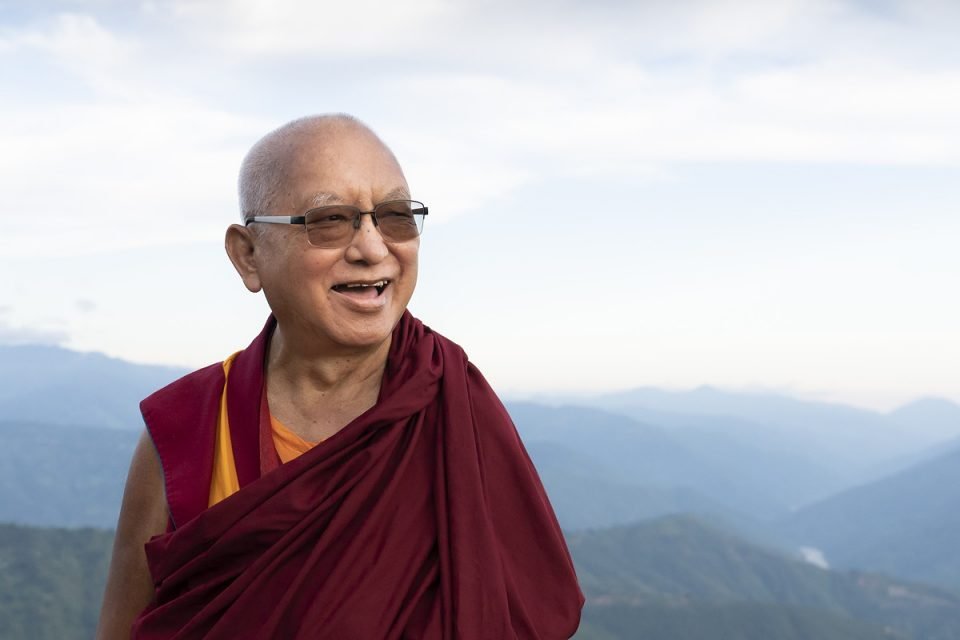
Lama Zopa Rinpoche in Maratika, Nepal, September 2021. Photo by Ven. Lobsang Sherab.
Lama Zopa Rinpoche continues his video teachings on thought transformation from Kopan Monastery in Nepal. Here is a summary of the most recent teaching:
Lama Zopa Rinpoche begins this teaching by explaining that people who don’t understand holy Dharma use prayers to pray for success in this life alone—for their relationships, their children, and other situations that will end at the end of this life. No matter how many degrees they have from Oxford or Cambridge University or how much they study science, they pray for this life only without praying for enlightenment or liberation from samsara or even the happiness of future lives. They don’t know about Dharma, karma, reincarnation, or past and future lives. And if human beings are like this, what about animals? They just run around after food all of the time. This is ignorance.
When you experience happiness, it is due to the kindness of mother sentient beings—every hell being, every hungry ghost, every animal, every human being, every sura being, every asura being, every intermediate state being. When you experience happiness, it is important to think, “I have received this by the kindness of others.” The other thing to think about when happiness occurs is that every happiness is thanks to the kindness of the guru.
Just like your consciousness has no beginning, your wrong concepts—which mean your delusions, ignorance, self-cherishing thought, attachment, and anger—are also beginningless. The antidote to impure appearances is tantra, Rinpoche explains. In tantra you visualize everything as pure—yourself as the deity, the place as the mandala, the beings you encounter as deities, sounds as mantras, thoughts as the dharmakaya. In tantra, the root of samsara is the impure subtle consciousness and wind. The continuation of all the wrong concepts has no beginning, so your suffering of samsara’s continuation also has no beginning. If you can remember that samsaric suffering is beginningless, you will immediately abandon nonvirtue and practice virtue. Once you think about beginningless samsaric suffering, hell, and the sufferings of all the realms, there is no time for self-cherishing, no time for all the negative karma.
In the West, people think, “I am alone, nobody loves me!” If you are Buddhist you must know that numberless buddhas and bodhisattvas cherish you the most! You are never alone. Buddha gave away his wives, sons, wealth, and body for sentient beings—including you! He practiced the six paramitas for sentient beings, including you! Buddha has perfect power—perfect holy body, holy speech, and holy mind—unlike us, who are limited. Buddha’s holy mind is everywhere. Once your obscurations are purified, you will see numberless buddhas wherever you are. Buddha’s compassion embraces all sentient beings, including you, all the time.
From the buddhas, you receive a perfect human rebirth, the happiness of this life, the happiness of future lives, liberation from samsara, and enlightenment. They buddhas are working for you by manifesting in the ordinary aspect of the guru. All of your happiness comes from the guru. This is a very important thing for you to remember!
All of your happiness comes from the guru, but all of your suffering comes from harming others. Shantideva’s Bodhicharyavatara says:
If I hadn’t harmed others,
Nobody could harm me.
That means that if you have problems, suffering, depression, even if somebody kills you, beats you, gets angry at you—this is because you harmed them in the past, in past lives. It could have been numberless eons ago. Sometimes as soon as the person sees you in this life, they shoot you, they are angry with you, even before meeting them in this life.
In the view of your disturbed mind, whatever your delusions believe appears to be good. In the view of anger, you think it is good to destroy and harm others. In the view of ignorance, you think it is good to believe things are real. In the view of pride, you believe that it is good to think about how you are better than everyone else. This is all totally wrong. But in your impure view, you believe what you are doing is good. This is the dance of a crazy person.
Someone who harms you is only an object of compassion. You abused that person in past lives, so now they are creating negative karma by harming you. If you hadn’t ever harmed them in the past, they wouldn’t have to harm you now due to karma! And because of harming you, they will have to get lost in the hole of hell. This is why you must only have patience when someone harms you; don’t harm them back. You must help the person, even just recite OM MANI PADME HUM. Do whatever you can do to create benefit.
If you have depression, cancer, the virus, or any suffering, think, “By experiencing this, may all sentient beings be free from disease, spirit harm, negative karma, defilements, and achieve enlightenment.” This will help you from sinking into despair, thinking, “Why is this happening to me? I’m the only one who this happens to!”
The main purpose of practicing thought transformation is not to stop suffering. While you are suffering with pain or a problem, you use that as the path to enlightenment, to benefit sentient beings and cause them to achieve enlightenment. If the problem stops, you have no condition to use in the path to enlightenment. If you want to stop the problem—you can do this with the power of bodhichitta and the good heart.
We invite you to go deeper into the topics presented here, plus many others, by watching Rinpoche’s video and reading the full transcript of Rinpoche’s teaching.
Watch Lama Zopa Rinpoche’s teaching “What to Think When You Are Depressed”:
- Read the transcript of Rinpoche’s teaching
- Find Rinpoche’s Teachings on Thought Transformation translated into Spanish, Italian, French, Chinese, and Russian
- Dedication verses
Watch more from the video series Lama Zopa Rinpoche’s Teachings on Thought Transformation and find links to videos in transcripts, MP3s, additional practice advice, and more:
https://fpmt.org/fpmt/announcements/resources-for-coronavirus-pandemic/advice-from-lama-zopa-rinpoche-for-coronavirus/
Lama Zopa Rinpoche is the spiritual director of the Foundation for the Preservation of Mahayana Tradition (FPMT), a Tibetan Buddhist organization dedicated to the transmission of the Mahayana Buddhist tradition and values worldwide through teaching, meditation and community service.
- Tagged: advice from lama zopa rinpoche, coronavirus, depression, lama zopa rinpoche thought transformation video teaching, video
24
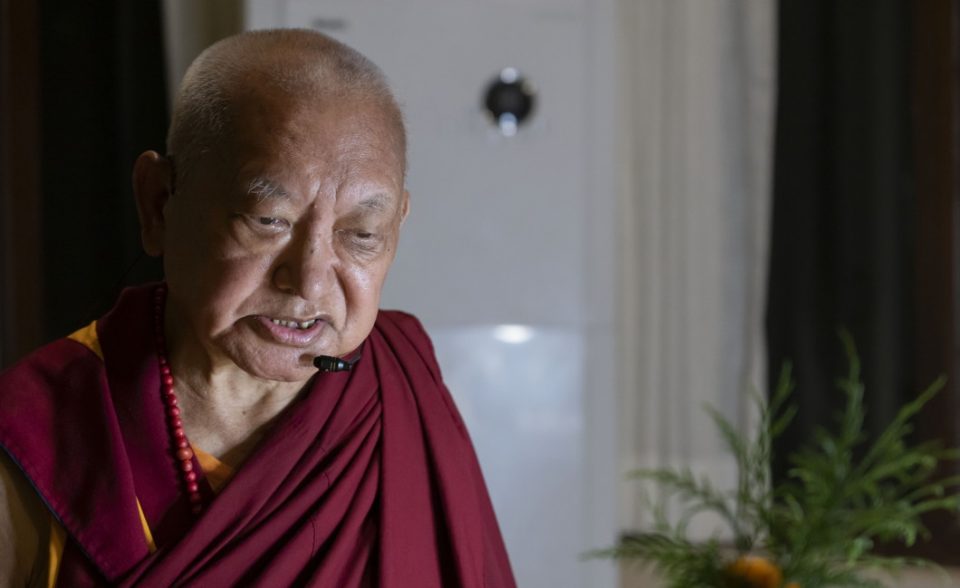
Rinpoche giving a video teaching in Maratika, Nepal, September 2021. Photo by Ven. Lobsang Sherab.
Lama Zopa Rinpoche continues his video teachings on thought transformation, recording this time in Maratika, Nepal. Rinpoche gave this teaching on the topic of depression at the request of a student. It was transmitted via Zoom to a live audience of students, mainly from Singapore, China, and Taiwan.
Lama Zopa Rinpoche begins this teaching explaining that to understand depression, we first have to understand our own craziness. Then, when we think of others, we will be able to more easily develop compassion.
Rinpoche then begins an explanation of how the I exists. There are non-Buddhist philosophies that believe that the I is permanent, exists alone, and has its own freedom. The four schools of Buddhist philosophy do not accept that. They believe that the I is impermanent and changes by causes and conditions, year by year, second by second.
As an example, Rinpoche talks about how a flower changes day by day to explain gross impermanence, which is evident in visible changes. When a person is young, they can appear beautiful, but over time that changes. Their entire form can change, and they are no more an object of attraction, of attachment. If you become attached to the beauty of an object, this brings so much pain and suffering to your heart due to impermanence. Because beauty changes, there’s nothing to be attached to.
Rinpoche then discusses how we mistakenly think that the I exists as permanent, alone, and with its own freedom. He also goes over other mistaken views of how the I exists, including those of some of the Tibetan Buddhist schools. But, Rinpoche acknowledges, the Chittamatra view that everything comes from the mind can help depression.
Emotions and problems come from the basic wrong concept that believes that the I is permanent, exists alone, and exists with its own freedom. From that, emotions and all the problems come. You fight while holding your wrong view—you kill and smash. It’s childish. Then in the view of a mind disturbed by spirit possession and delusions, harmful actions appear to be positive! For example, Rinpoche explains, when anger arises, a disturbed mind thinks that it is positive.
Attachment and anger arise based on how ignorance discriminates good and bad. Quoting from Lama Tsongkhapa in Lamrim Chenmo:
Ignorance, which is in the nature of exaggeration, exaggerates the differentiations into good and bad. Then attachment and anger arise. Therefore, the way of holding [objects] by these [wrong concepts] can also be gotten rid of by logic.
Rinpoche explains that an object is merely labeled. On the basis of that, ignorance exaggerates the object and sees it as not merely labeled. Then based on that exaggeration, you discriminate good and bad. After that, anger and attachment come. You can prove that anger and attachment are wrong and come from wrong concepts.
So, where is the depression? Attachment and anger. There is the depression that you understand the reason for and depression that you don’t know the reason for. In some cases, you know why you are feeling depressed. You wanted something that you didn’t get. Your attachment or self-cherishing didn’t get what it wants. In other cases, you don’t know why you are feeling depressed, and that is related to your past life actions of nonvirtue, your negative karma.
Depression does not come from the view of bodhichitta. Even if you have the view of effortful bodhichitta, you will not be depressed, Rinpoche explains. There is also no depression if you have the view of wisdom realizing emptiness.
So depression comes from the basic wrong concept of how the I exists. Your wrong concepts are the real craziness. There is so much to meditate on, to analyze, to learn, and to recognize. You have to discover the truth in your life, Rinpoche says. It is so important.
Rinpoche then discusses the Prasangika view of how the I exists. This ultimate right view is what we need to meditate on, realize, and develop because it ceases the seed of delusion and karma. The I that exists, exists in mere name, labeled by the mind that focuses on the valid base, the aggregates. That’s it, Rinpoche explains. Therefore, it is totally empty. There is not one atom of I exiting from its own side. Because nothing exists from its own side, there is no basis for depression to arise.
What can we do when we experience depression?
- Practice mindfulness that nothing exists from its own side.
As you live your life, practice mindfulness that every action, every object, every phenomenon is totally empty. Like this, the depression is also empty; nothing exists from its own side.
- Practice mindfulness that everything is a hallucination.
Whatever you do—the appearances, all the different wrong views that you have—understand that everything comes from the mind. So you recognize the dream as a dream. This helps keep the unhappy mind from arising. It also helps the immune system as anger has a negative effect on the immune system as well. So this also protects you from disease. So, loving kindness, peace, satisfaction, contentment, patience—all these help your physical health as well as your mental health.
Rinpoche offers a more detailed commentary on these points in the video, and anyone wishing to use Rinpoche’s advice to reduce depression is encouraged to watch the video and follow along in the transcript for the full advice.
Watch Lama Zopa Rinpoche’s teaching “From Where Depression Comes”:
- Read the transcript of Rinpoche’s teaching
- Find Rinpoche’s Teachings on Thought Transformation translated into Spanish, Italian, French, Chinese, and Russian
- Dedication verses
Watch more from the video series Lama Zopa Rinpoche’s Teachings on Thought Transformation and find links to videos in transcripts, MP3s, additional practice advice, and more:
https://fpmt.org/fpmt/announcements/resources-for-coronavirus-pandemic/advice-from-lama-zopa-rinpoche-for-coronavirus/
Lama Zopa Rinpoche is the spiritual director of the Foundation for the Preservation of Mahayana Tradition (FPMT), a Tibetan Buddhist organization dedicated to the transmission of the Mahayana Buddhist tradition and values worldwide through teaching, meditation and community service.
- Tagged: advice from lama zopa rinpoche, coronavirus, depression, impermanence, lama zopa rinpoche thought transformation video teaching, video
20
Freedom Is in Our Hands
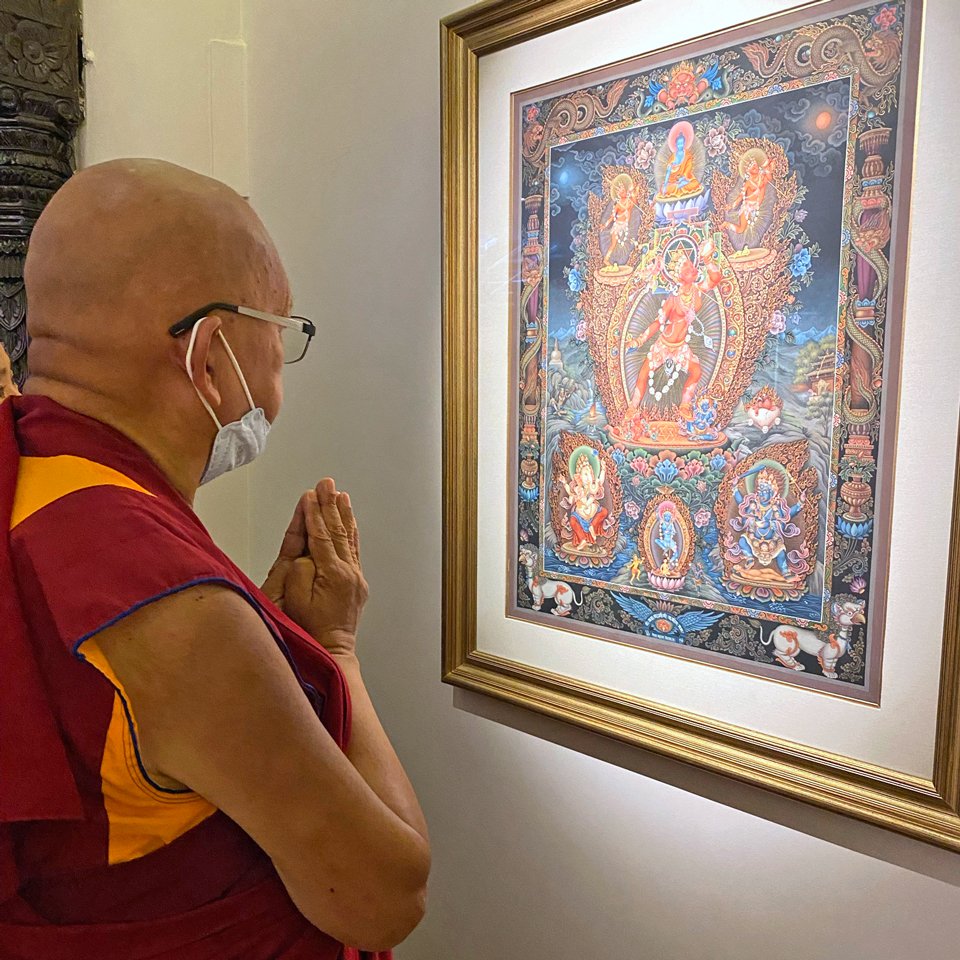
Lama Zopa Rinpoche making prayers in front of sacred images in a museum of Newari art, Kathmandu, Nepal, July 2021. Photo by Ven. Roger Kunsang.
In the following short video, Lama Zopa Rinpoche examines the question of why certain things happen:
Why does a tornado pick up a car and drop it out of the sky, killing a certain person? Why are leaves and petals of a flower made a certain way? What decides the colors of a butterfly’s wings or the colors of a peacock’s tail?
Lama Zopa Rinpoche explains that the answer to all these questions is karma, in particular, subtle karma. Because all these things come from karma, that also means they all come from the mind.
Rinpoche says, “Because of that, we can create suffering, we can create happiness, we can create enlightenment, we can create hell. So we have freedom in our hands.”
In short, Rinpoche explains that we should use our understanding of the external world to understand how our mind has great freedom.
Watch the video “Freedom Is in Our Hands“:
Read the transcript of Rinpoche’s teaching.
The above video is extracted from a teaching given on May 30, 2019, during the Vajrayogini retreat at Institut Vajra Yogini in France. You can find more blogs with short video clips from Rinpoche’s teaching as well as the complete collection of these “Essential Extracts” videos on FPMT.org.
Watch videos from the series Lama Zopa Rinpoche’s Teachings on Thought Transformation and find links to transcripts, MP3s, additional practice advice, and more. Read an in-depth summary of Rinpoche’s thought transformation teachings given in 2020 in the Mandala 2021 article “The Time to Practice Is Now.”
Lama Zopa Rinpoche is the spiritual director of the Foundation for the Preservation of Mahayana Tradition (FPMT), a Tibetan Buddhist organization dedicated to the transmission of the Mahayana Buddhist tradition and values worldwide through teaching, meditation and community service.
14
Why Do We Take Refuge?
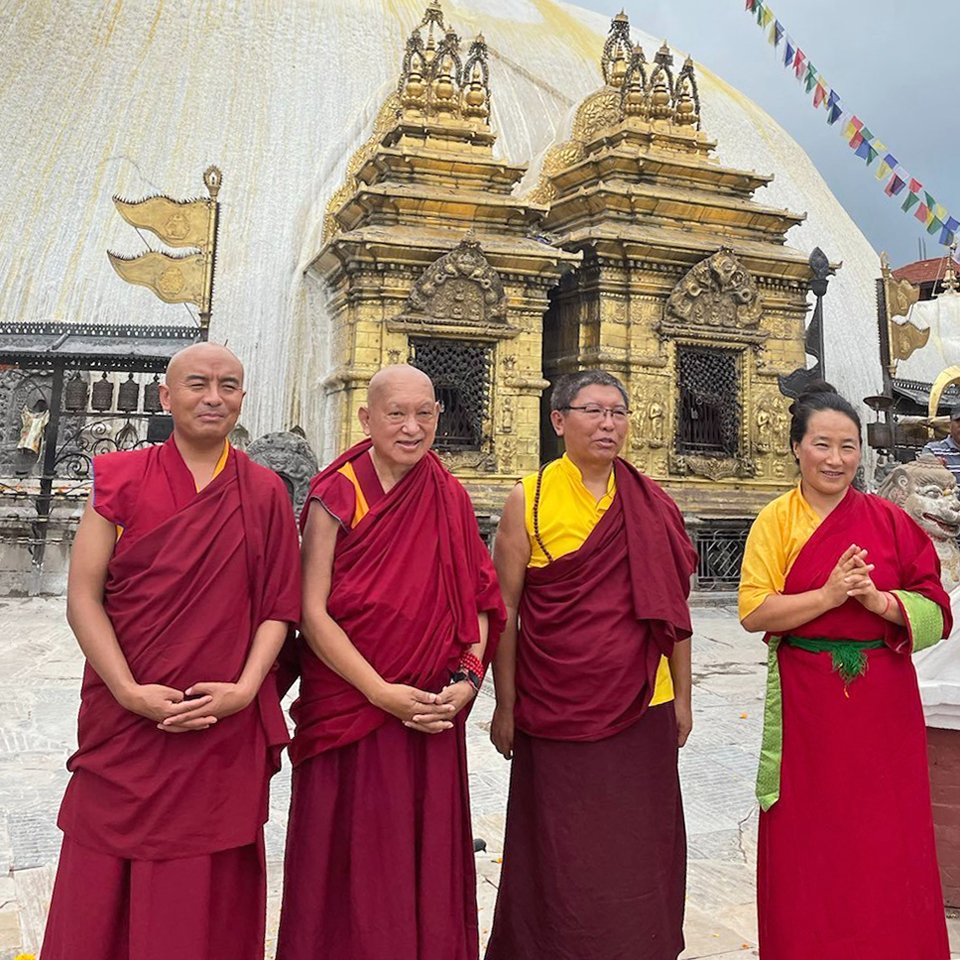
Mingyur Rinpoche, Lama Zopa Rinpoche, Tsoknyi Rinpoche, and Khadro-la at Swayambunath, Nepal, June 2021. Photo by Ven. Thubten Tendar.
During a retreat in 2017, a student asked Lama Zopa Rinpoche about a bad hurricane that had just caused great damage to parts of the Caribbean and Florida Keys: “If it is the karma of the people on the islands to experience the hurricane, how can we change their karma?” Here is a summary of Rinpoche’s response, which you can watch in the video below:
Rinpoche explains that we pray so that we can purify the negative karma so that the violent weather isn’t experienced and so the landlord beings do not create harm. Praying to Buddha, Dharma, and Sangha, and to the Guru has the power to change things and help people who are in danger.
After all, why do we take refuge in the Buddha, Dharma, and Sangha? “That is a big question. Forget about the hurricane, [and think about] just yourself and how [Buddha, Dharma, Sangha, and the Guru] can guide you,” Rinpoche says.
The lamrim explains there are four reasons why the Buddha can guide you, which Rinpoche discusses. “The Buddha himself is free from all dangers—so skillful in liberating others from all the sufferings, all the dangers—no discriminating thought, compassion to every sentient being.”
Rinpoche emphasizes that it is very important to study the lamrim. “If you never study then [it’s] difficult to understand. You must study [it], over and over, many times,” Rinpoche says, because each time you go over a part of the lamrim you will notice something different.
Rinpoche responded to the question before doing tsog. He tells all the retreat participants, “Buddha, Dharma, and Sangha, the merit field, [they] know what we are doing now, what we are asking. … So when you pray you have to know that [this is] not blah, blah, blah. … Then also when you pray you must be aware [that] they know what you are doing now, what you are asking.”
Watch the video “Question and Answer: Can We Change Karma?”
The above video is extracted from a teaching given on September 6, 2017, at the Light of the Path Retreat in North Carolina, US. You can find more blogs with short video clips from Rinpoche’s teaching as well as the complete collection of these “Essential Extracts” videos on FPMT.org.
Discover the ongoing video teaching series Lama Zopa Rinpoche’s Teachings on Thought Transformation, where you can also find links to transcripts, MP3s, additional practice advice, and more.
Lama Zopa Rinpoche is the spiritual director of the Foundation for the Preservation of Mahayana Tradition (FPMT), a Tibetan Buddhist organization dedicated to the transmission of the Mahayana Buddhist tradition and values worldwide through teaching, meditation and community service.
2
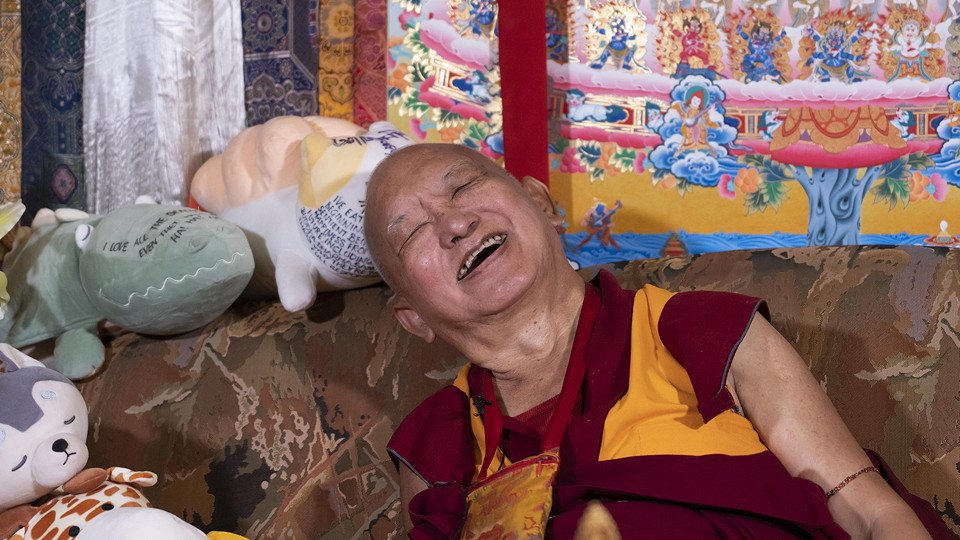
Rinpoche laughing during a video teaching, Kopan Monastery, Nepal, August 2021. Photo by Ven. Lobsang Sherab.
Lama Zopa Rinpoche continues his video teachings on thought transformation from Kopan Monastery in Nepal. Here is a summary of the most recent teaching:
Rinpoche continues offering teachings specifically intended for ordained Sangha, but everyone is welcome to benefit from Rinpoche’s advice. He begins this video teaching by reminding us that we have received this perfect human rebirth with the freedom to practice Dharma qualified by the eight freedoms and ten richnesses. This rebirth is extremely rare and precious. Even having the first freedom of not being born in hell is most precious.
It is important to understand your own samsaric suffering. If you don’t, you can’t generate compassion for all sentient beings. You must view being in samsara as being in the center of a fire. You have to feel all of your suffering as unbearable, not as pleasure. From that, great compassion for every sentient being comes. From that, bodhichitta arises—the thought to free all beings from oceans of samsaric suffering and bring them to enlightenment. For that, we need omniscience and enlightenment for ourselves. No one achieves enlightenment without saying goodbye to samsara.
This life is amazing, but it can stop at any time. Right now there are numberless beings dying in the mother’s womb, as babies, as children, in middle age, in old age; one’s breathing can stop at any time. It is like a bubble in water or lightning in the sky.
Rinpoche then discusses the power of holy objects and the benefits of building statues, stupas, and temples. Often building statues and temples doesn’t make sense to Westerners. They think it is too expensive and a waste of money, Rinpoche explains, because they don’t understand the benefits.
Rinpoche quotes from and gives commentary on Sutra Requested by King Prasenajit:
According to however many subtle atoms
Stupas or statues of the Bhagavan have,
For that many lifetimes the human beings who construct them
Will definitely attain wheel-turning king in the deva realm above ground.
They will experience all the supreme grounds
Of perfect concentration of the form and formless realms
And, at the end, they will attain the state of a buddha,
Which is free from the sufferings of birth, aging, and so forth.
Even the creatures killed under the feet of people building a temple will not fall into the lower realms. The teachings of Pandita Nagkyi Rinchen say:
The sentient beings touched by the smoke from preparing food and drink for those making
a place for the Three Rare Sublime Ones to abide and also the creatures killed under the
feet of the workers will not fall into the abodes of the three lower realms.
Even looking at a drawing of a buddha when you are angry causes you to gradually see ten million buddhas. From White Lotus Sutra:
Even if with an angry mind you look
At a drawing of a buddha’s body on a stone wall,
Gradually you will see ten million buddhas.
His Holiness the Dalai Lama said that the real stupa is the realizations of the path to enlightenment within you. You need to dedicate yourself to actualizing the lamrim. No matter how much practice, prostrations, and mantras you do, the main path is listening, reflecting, and meditating on the lamrim.
You cannot receive the blessings of the buddhas without a guru. From Dütsii Nyingpo, Essential Nectar:
Even if the beams of the sun are so hot,
Without a magnifying glass they cannot produce fire.
Like that, also the Buddha’s blessings
Cannot be received without a guru.
Like that, by pleasing the guru,
You please all the buddhas.
The guru is the channel through which the ten-direction buddhas guide you and speak to you. You should serve the guru with the mindfulness that the guru is the channel for all the buddhas. The guru is not just someone who gives you a Dharma education. That is a very ordinary view. Without strong guru devotion, heresy and anger arise in relation to the guru, and you create the heaviest negative karma among the negative karmas. Because the essence is pleasing the guru, you need to concentrate on that in everyday life. By pleasing the guru, negative karmas get burned in one second!
Some people spend their whole lives meditating without an object because they don’t have a correct guru. After some time, your mind becomes dull. In this world it is very difficult to meet a perfect guru. For those that do not have the merit to meet a perfect guru and receive perfect teachings, and who have so much suffering and are going on the wrong path, you can develop compassion for them.
You also cannot achieve enlightenment without bodhichitta. As much as possible, do everything with bodhichitta. Even if you don’t have a realization of bodhichitta, but have a bodhichitta motivation, everything you do becomes a cause for enlightenment. By making requests to your guru with firm devotion, you develop realizations.
In order to achieve enlightenment in a brief lifetime, you need to practice highest yoga tantra because otherwise you lose the opportunity. Then, to be able to develop compassion, to be able to develop the graduated path to enlightenment, you need to purify the obstacles, obscurations, and negative karma, and collect the necessary conditions and merit.
The essence of the practice is persevering in the higher training of morality. You should take the individual liberation vow as your heart practice. Morality is the heart practice. You cannot practice Dharma separately from keeping your promised morality. You should keep the three vows that you have taken: the individual liberation vow, the bodhisattva vows, and the tantric vows.
Where you go in your future life depends on your present actions. You can tell what types of actions you did in the past by looking at your current life, and where you will go next life depends on today.
We invite you to go deeper into the topics presented here, plus many others, by watching Rinpoche’s video and reading the full transcript of Rinpoche’s teaching.
Watch Lama Zopa Rinpoche’s teaching “There Is Nothing More Sublime Than Practicing the Higher Training of Morality”:
- Read the transcript of Rinpoche’s teaching
- Prayer for the Flourishing of Je Tsongkhapa’s Teachings PDF
- Find resources to support your study of lamrim
- Learn more about FPMT’s Holy Objects Fund
- Find Rinpoche’s Teachings on Thought Transformation translated into Spanish, Italian, French, Chinese, and Russian
- Dedication verses
Watch more from the video series Lama Zopa Rinpoche’s Teachings on Thought Transformation and find links to videos in transcripts, MP3s, additional practice advice, and more:
https://fpmt.org/fpmt/announcements/resources-for-coronavirus-pandemic/advice-from-lama-zopa-rinpoche-for-coronavirus/
Practice advice from our teachers, Dharma study-from-home opportunities, and more can be found on the page “Resources for the Coronavirus Pandemic.”
Lama Zopa Rinpoche is the spiritual director of the Foundation for the Preservation of Mahayana Tradition (FPMT), a Tibetan Buddhist organization dedicated to the transmission of the Mahayana Buddhist tradition and values worldwide through teaching, meditation and community service.
- Tagged: advice from lama zopa rinpoche, coronavirus, lama zopa rinpoche advice for sangha, lama zopa rinpoche thought transformation video teaching, lamrim, perfect human rebirth, three higher trainings, video
25
Being Sangha Is Not a Trip
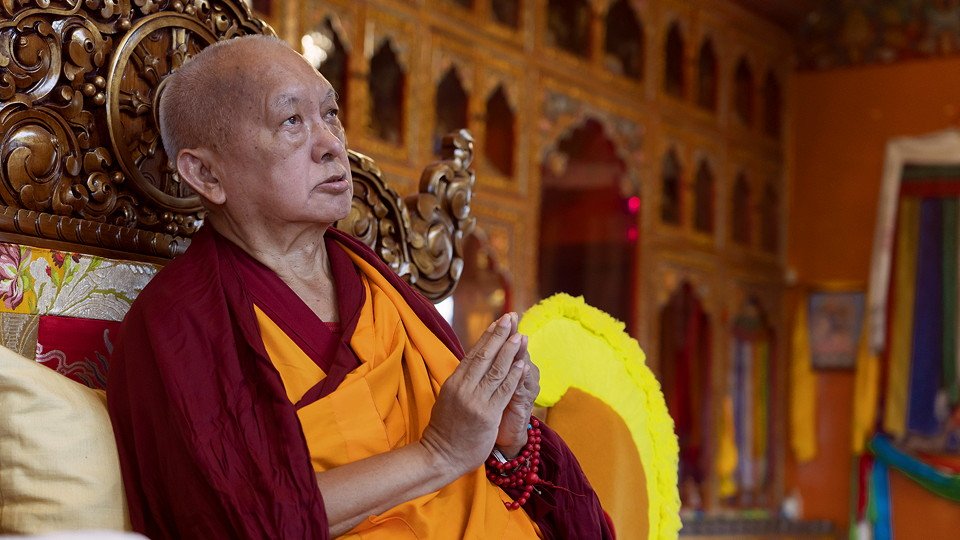
Lama Zopa Rinpoche during Lama Chopa puja, Kopan Monastery, Nepal, August 2021. Photo by Ven. Lobsang Sherab.
Lama Zopa Rinpoche continues his video teachings on thought transformation from Kopan Monastery in Nepal. Here is a summary of the most recent teaching:
Rinpoche begins this teaching by reminding us that while we are so fortunate to have received this rare and perfect human rebirth, which is qualified by the eight freedoms and ten richnesses, death can happen at any time, even before this teaching ends.
Therefore, the real purpose of life is not just to achieve liberation from samsara for ourselves alone, but to never harm and only benefit all sentient beings by freeing them from the oceans of samsara, the total cessation of the gross and subtle obscurations and the completion of realizations. That means every single one, including every ant and fly, and even those you can’t see with your eyes. As a human, this should be the purpose of life. This should be our attitude all day and night, even if we are enjoying ourselves in a five-star hotel, even if we are in the process of dying—we can enjoy for sentient beings, we can die for sentient beings! To bring every sentient being to enlightenment by oneself alone is the purpose of life, therefore we must achieve a state of omniscience as quickly as possible. Therefore, I’m going to listen to the teachings.
Rinpoche shares that the current incarnation of Domo Geshe Rinpoche is going to be an incredible benefit to the world by helping the teachings spread and last a long time. Rinpoche currently offers help for this young lamas’ yearly expenses.
Rinpoche also shared some stories of Sera Je Khen Rinpoche Lobsang Delek’s life in the Buxa Duar, the camp in India where refugee Tibetan monks lived in the 1960s.
Rinpoche reminds us that these teachings are specifically for the ordained Sangha, to remind them that it is most important to live a life in ordination and that this is not just some hippie trip. However, anyone is welcome to listen and benefit from this advice.
Rinpoche then discusses sections from Garland of Jewel Light by Geshe Tsewang Samdrub. He begins by offering commentary on the four doors for receiving downfalls from breaking vows:
1. A lack of conscientiousness.
2. A lack of respect.
3. Not knowing the vows.
4. Having many delusions.
His Holiness the Dalai Lama has emphasized the need to live an ethical life, to be a good human being, Rinpoche says. To do this, you need discipline to practice patience, tolerance, compassion, loving-kindness, and forgiveness for those who harm you, and to immediately apologize when you harm others.
Rinpoche explains the four ways to prevent downfalls, citing Garland of Jewel Light:
1. Continuously possessing conscientiousness.
2. Having great respect for the vows of morality.
3. Knowing the vows.
4. Striving in the remedy to the delusions.
When you do these, the doors to making mistakes and downfalls are closed.
Rinpoche then goes over the benefits of protecting morality, again from Garland of Jewel Light:
1. All your collections of goodness will increase and develop.
2. You will be praised by the buddhas.
3. You will be praised by the devas.
4. You will be praised by your friends.
5. You will be worthy of being praised by even yourself.
6. You will be worthy of being naturally praised.
7. Your reputation will cover all the directions.
8. You will listen to the holy Dharma.
9. You will not forget the holy Dharma you listened to.
10. Your realizations of the paths and bhumis will increase.
11. When you die you will be happy and you will go to a happy transmigration.
12. Day and night you will be happy.
13. You will be protected by the devas.
14. You will be happy in front of holy beings.
15. You won’t be able to be harmed by human beings and non-human beings.
16. You will receive whatever enjoyments you need without effort.
17. Whatever prayers you do will succeed.
The results of living in pure vows are very powerful. “You become Dzambhala!” Rinpoche says. “When other people make offerings to you and respect you, they collect much merits. And then, if you pray for them, your prayers are so powerful that there is success for them. Like that, your pujas and your prayers are very powerful.”
We invite you to go deeper into the topics presented here, plus many others, by watching Rinpoche’s video and reading the full transcript of Rinpoche’s teaching.
Watch Lama Zopa Rinpoche’s teaching “Being Sangha Is Not a Trip”:
https://youtu.be/LgmNLjvt564
- Read the transcript of Rinpoche’s teaching
- Find Rinpoche’s Teachings on Thought Transformation translated into Spanish, Italian, French, Chinese, and Russian
- Dedication verses for COVID-19 Crisis Teachings
Watch more from the video series Lama Zopa Rinpoche’s Teachings on Thought Transformation during the Time of COVID-19 and find links to videos in transcripts, MP3s, additional practice advice, and more:
https://fpmt.org/fpmt/announcements/resources-for-coronavirus-pandemic/advice-from-lama-zopa-rinpoche-for-coronavirus/
Practice advice from our teachers, Dharma study-from-home opportunities, and more can be found on the page “Resources for the Coronavirus Pandemic.”
Lama Zopa Rinpoche is the spiritual director of the Foundation for the Preservation of Mahayana Tradition (FPMT), a Tibetan Buddhist organization dedicated to the transmission of the Mahayana Buddhist tradition and values worldwide through teaching, meditation and community service.
- Tagged: advice from lama zopa rinpoche, coronavirus, domo geshe rinpoche, garland of jewel light, lama zopa rinpoche advice for sangha, lama zopa rinpoche thought transformation video teaching, video
24
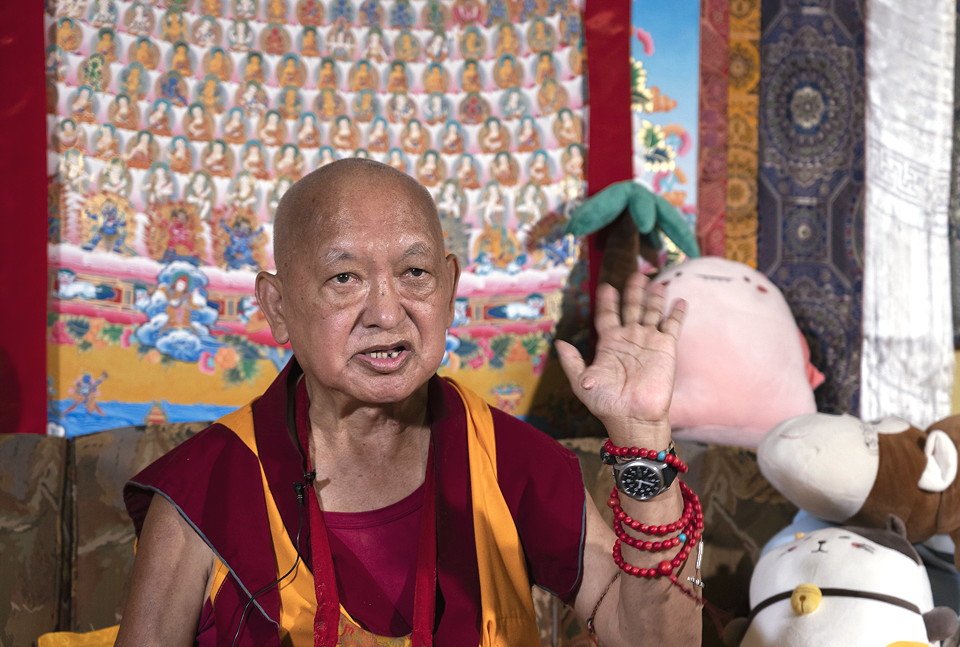
Lama Zopa Rinpoche during a video teaching on thought transformation, Kopan Monastery, Nepal, August 2021. Photo by Ven. Lobsang Sherab.
Lama Zopa Rinpoche continues his video teachings on thought transformation from Kopan Monastery in Nepal. Here is a summary of the most recent teaching:
Rinpoche begins this teaching by reminding us of how fortunate we are to wake up in the morning with a perfect human rebirth that is qualified by the eight freedoms and ten richnesses. The life we have is like a candle flame in the wind or a bubble in the water, and can be stopped at any time by death. Rinpoche references verse 55 from Nagarjuna’s Letter to a Friend:
Since there are many harms to life, it is more impermanent
Than even a water bubble that can be popped by the wind.
Therefore, how wonderful it is to have the freedom
To be able to wake up from sleep, breathing in and out.
Last night many people went to bed, thinking they had another day to live, but their body became a corpse instead. However, you were able to wake up. Every day you are able to wake up is a real birthday. If you can recognize impermanence and death, it is like skies of happiness! You didn’t die! You aren’t in hell! You weren’t reborn as a hungry ghost or an animal! You can still use your perfect human rebirth to collect merit and purify negative karma. Even reciting OM MANI PADME HUM without a bodhichitta motivation, you collect more merits than drops of water in the ocean, more than blades of grass growing on the hills.
When your breathing stops it will be difficult for your mind to be happy. A verse from Gungthang Tenpai Dronme’s Verses of Advice for Meditating on Impermanence says:
While you are still breathing,
If you don’t accomplish stable happiness,
When your breathing in and out stops,
It will be difficult for your mind to be happy.
Rinpoche then reminds us of the motivation for listening to these teachings. At this time, while we are still breathing, it is not enough to achieve liberation from samsara for oneself. That alone would be a meaningful life, but it is not sufficient. The main purpose of life is to benefit sentient beings, not harming a single one, and more than that to free them from oceans of samsaric suffering and bring them to enlightenment by oneself alone. To do that, we must achieve full enlightenment. Therefore, with a motivation to accomplish this, we listen to the teachings.
Rinpoche offers advice to the gelongs about what brings happiness according to several verses of the Sutra of Individual Liberation (from sojong). You can hear Rinpoche discuss these verses and his commentary on each starting at 11:50 in the video.
Without morality, Rinpoche stresses, we cannot accomplish our own work, let alone successfully work for others. “Therefore,” as noted in the Thirty-Seven Practices of a Bodhisattva by Thogme Sangpo (verse 26cd), “to protect morality without wishing for samsara is a practice of a bodhisattva.”
For a bodhisattva, those who offer harm are like a precious treasure (Thirty-Seven Practices of a Bodhisattva, verse 27ab):
For the bodhisattvas who desire the enjoyment of virtue,
All harm-givers are like a precious treasure.
Therefore, cherish evil beings like a precious treasure, as advised in Eight Verses for Training the Mind by Langri Tangpa:
When I see sentient beings of evil nature
Who engage in negative karma and have much suffering,
Since they are difficult to find I will cherish them,
Like finding a precious treasure.
Rinpoche stresses that it is important to understand what this means. People who create harm for others create so much negative karma and have so much suffering. When you see that it is like you have found a precious treasure, a diamond, gold, a sapphire, a wish-granting jewel in the garbage. They are so precious and rare that you must cherish them, like how some cherish money so much! Why? Because by cherishing them you generate strong renunciation of your own samsara and sooo much compassion for them. From that, you generate strong bodhichitta, and from that, quick enlightenment. And with that you can liberate the numberless sentient beings from oceans of samsaric suffering. A jewel or money doesn’t do that, but this type of person can! So cherish them.
Another verse Rinpoche emphasizes in this teaching and suggests we write down in our prayer books is verse 28 from Thirty-Seven Practices of a Bodhisattva:
Since even the hearer-listeners and solitary realizers, who achieve only the works for self,
Are seen to make effort, like putting out a fire on the head,
It is a practice of a bodhisattva to make effort to receive all qualities
For the sake of all transmigratory beings.
Even when you seek liberation for just yourself, when delusion arises, you put effort into getting rid of the delusion, like putting out a spark of fire on your head. But when you do it to liberate every single hell being, hungry ghost, animal, and human being, you do it so they will achieve all the qualities from the Mahayana path, for all of their negative karma and delusions to stop. This is unbelievable! Achieving liberation for oneself is nothing when compared to doing this for numberless beings. You are just one person, but transmigratory beings are numberless. Even mosquitoes and ants are just as important as yourself. So you stop delusions from arising in your own mind for them. It is so important to work for them, to free them from the lower realms and samsara, and to help them achieve enlightenment.
Write the above verse down so you can learn it, Rinpoche says. Otherwise, your motivation will always be controlled by the self-cherishing thought. “Today I don’t feel like it. I don’t want to recite my prayers or OM MANI PADME HUM. I feel too depressed.” Reading this verse helps you remember that you are doing it for all transmigratory beings, not just for yourself.
Rinpoche also suggests writing this verse down so we can remember it (from Shantideva’s Bodhicharyavatara, verse 5.12):
Since the sentient beings who disturb you are like space,
You can never finish destroying them.
But if you destroy the mind of anger alone,
It’s like you have destroyed all outside enemies.
The one enemy you have is inside you—your mind, your anger. How you destroy this enemy is by practicing patience. By controlling the mind, everything else is controlled and you have no fear. The most important practice is to control your mind. Subduing one’s own mind is the teaching of Buddha, the essence of everything.
We invite you to go deeper into the topics presented here, plus many others, by watching Rinpoche’s video and reading the full transcript of Rinpoche’s teaching.
Watch Lama Zopa Rinpoche’s teaching “The Most Important Practice Is to Control Your Mind”:
https://youtu.be/wX6E2ja5TgM
- Read the transcript of Rinpoche’s teaching
- Shantideva’s Bodhicaryavatara Color PDF translated by Toh Sze Gee
- Eight Verses of Thought Transformation eBook & PDF by Langri Tangpa
- Find Rinpoche’s Teachings on Thought Transformation translated into Spanish, Italian, French, Chinese, and Russian
- Dedication verses for COVID-19 Crisis Teachings
Watch more from the video series Lama Zopa Rinpoche’s Teachings on Thought Transformation during the Time of COVID-19 and find links to videos in transcripts, MP3s, additional practice advice, and more:
https://fpmt.org/fpmt/announcements/resources-for-coronavirus-pandemic/advice-from-lama-zopa-rinpoche-for-coronavirus/
Practice advice from our teachers, Dharma study-from-home opportunities, and more can be found on the page “Resources for the Coronavirus Pandemic.”
Lama Zopa Rinpoche is the spiritual director of the Foundation for the Preservation of Mahayana Tradition (FPMT), a Tibetan Buddhist organization dedicated to the transmission of the Mahayana Buddhist tradition and values worldwide through teaching, meditation and community service.
- Tagged: a guide to the bodhisattva's way of life, advice from lama zopa rinpoche, coronavirus, eight verses of thought transformation, lama zopa rinpoche advice for sangha, lama zopa rinpoche thought transformation video teaching, sutra of individual liberation, thirty-seven practicies of a bodhisattva, three higher trainings, video
23
Don’t Let Your Mind Go Berserk
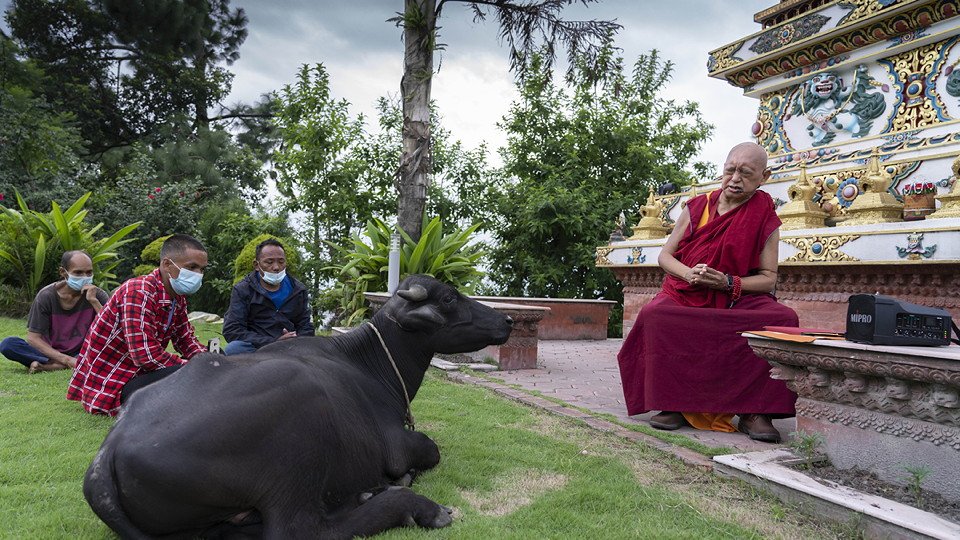
Lama Zopa Rinpoche reciting mantras to a young buffalo that he liberated for His Holiness the Dalai Lama and Kopan monks and nuns, Kopan Monastery, Nepal, August 2021. Photo by Ven. Lobsang Sherab.
Lama Zopa Rinpoche continues his video teachings on thought transformation from Kopan Monastery in Nepal. Here is a summary of the most recent teaching:
Rinpoche begins this teaching by reminding us that we are so fortunate to have received a precious and perfect human rebirth. While it is precious, it is also fragile and can be ended at any time with death. In this precious life we have received teachings on how we should not harm any sentient being, and not just the ones we love and like to help, but including those we don’t like such as mice, rats, spiders, cockroaches, and mosquitoes. When mosquitoes come near your ears you become very concerned with the real I, which doesn’t even exist in mere name. This has been happening since beginningless rebirths. So much suffering, including all wars, comes from believing in the real I! Even spiders and ants suffer due to believing in the real I.
The pandemic and all of the disasters of the world are happening because of ignorance. This all comes from the mind. Therefore, you have to take care of the mind: don’t let it go berserk. If you don’t want to suffer, if you don’t want bad things in the world, if you don’t want problems with the environment, if you want to make a happy world, then take care of the mind.
Rinpoche shares several stories about how great bodhisattvas are able to manipulate the elements or perform actions that look like miracles. They are able to do this due to their minds. Whether you make the world more peaceful or not depends on your mind. Rinpoche also shares the story of how the young incarnation of His Holiness the Fourteenth Dalai Lama said, “I’m the one who works for all beings” to the lama Keutsang Rinpoche when he came to check whether the four-year-old child recognized him. Rinpoche expressed being moved to tears when he heard that His Holiness had said that as a young child.
Rinpoche then discusses verses 5.4-5.5 of Bodhicharyavatara:
Tigers, lions, elephants, bears,
Snakes, and all enemies,
The guardians of hell beings,
Evil spirits, and likewise cannibals,
Are all fastened
By fastening only this mind.
They are all subdued
By subduing only this mind.
Rinpoche urges us to write these verses down in our prayer books so we will see them every day. Especially when we are angry or selfish, or when we have so much attachment. When we subdue our minds, everything is subdued. When we have control over our minds, we are free from fear. By controlling our minds and making them free from attachment and anger, from the self-cherishing thought, and from the ignorance holding the I as real when it’s not, then, all those who would otherwise harm us are subdued.
We produce all the suffering we experience with our mind, so the solution for problems, harm, enemies, and fear is to pacify the mind.
Verse 5.12cd of Bodhicharyavatara says:
If you subdue the mind of anger alone,
It is like you have subdued all your enemies.
And as Nagarjuna said:
If you kill your anger,
You kill all your enemies.
We have to learn this if we want to bring peace and happiness to the world. Otherwise, you just talk, talk, talk. Everything depends on whether you control your mind or not. Rinpoche translates verse 5.3 of Bodhicharyavatara as:
If you fasten the elephant of your mind
With the rope of remembrance all the time,
All fears will become nonexistent
And all virtues will come into your hands.
By subduing the mind, which is like a crazy elephant, you can achieve anything you want. Whether or not you experience samsara or nirvana, hell or enlightenment—this all depends on whether or not you control your mind.
Verse 5.17 of Bodhicharyavatara says:
If someone doesn’t know the supreme principal of the Dharma,
The secrecy of the mind,
Even if they wish to achieve happiness and destroy suffering,
They will wander in samsara without meaning.
and verse 5.18cd:
Except for conduct protecting the mind
What is the use of so many conducts?
Rinpoche explains that all the capacities of the mind are based on keeping the higher training of morality. He shares the story of how Lama Yeshe stopped a fire with his mind. He also shares a story about how Geshe Lama Konchog saved a child, who all the doctors said was going to die, by the power of his mind through doing puja. The West needs to learn that world peace comes from the mind, not from outside influence.
Discussing the verses below, Rinpoche says that when you don’t keep and protect your vows and your practice of morality, you will be criticized by all the buddhas, and your friends will scold you. You will even criticize yourself! But if you keep pure morality, all the buddhas will praise you and all of your prayers will succeed.
Chen Nga Lodro Gyaltshen, a Kadampa geshe advised in Dulwäi Lung:
Anyone who does not protect their vows
Will be put down by all the buddhas.
All the devas will criticize them as thieves.
Their friends will scold them.
They will even put themselves down.
They will also naturally be worthy of being criticized.
Their bad reputation will pervade all directions.
They won’t hear the holy Dharma.
Even if they hear it, they will quickly forget it.
They won’t generate the realizations of the grounds and paths.
While regretting, they will die and go to evil migrations.
In dreams, they will see vicious things
And, with suffering, they will be killed.
The devas will not protect them.
When they are in the presence of holy beings,
They will be scared and feel regret for their mistakes.
Since humans and non-humans will examine them,
They will be able to quickly harm them.
They will be unable to find enjoyments without difficulties.
They also won’t achieve what they wish.
Those who keep pure morality
Will be praised by all the buddhas
And all their wishes will be fulfilled.
Apply what was explained before to them.
During the dedications, Rinpoche shares the story about a young buffalo he recently liberated and named Bodhichitta. This buffalo showed great devotion to Rinpoche and sat down at Rinpoche’s feet when Rinpoche recited mantras. The buffalo had tears in both eyes during the recitation. You can read Rinpoche’s explanation of why he liberated this buffalo and also watch a short video of Rinpoche reciting prayers for him.
We invite you to go deeper into the topics presented here, plus many others, by watching Rinpoche’s video and reading the full transcript of Rinpoche’s teaching.
Watch Lama Zopa Rinpoche’s teaching “Don’t Let Your Mind Go Berserk”:
https://youtu.be/4z0txtA354g
- Read the transcript of Rinpoche’s teaching
- The Eight Prayers is a collection of prayers which is commonly recited in the Gelug monastic communities for the recently deceased. King of Prayers, the extraordinary aspiration of the prayer of Samantabhadra, is commonly recited to bring benefit to those who are sick or have just passed away, and for the success of a virtuous project.
- Find Rinpoche’s Teachings on Thought Transformation translated into Spanish, Italian, French, Chinese, and Russian
- Dedication verses for COVID-19 Crisis Teachings
Watch more from the video series Lama Zopa Rinpoche’s Teachings on Thought Transformation during the Time of COVID-19 and find links to videos in transcripts, MP3s, additional practice advice, and more:
https://fpmt.org/fpmt/announcements/resources-for-coronavirus-pandemic/advice-from-lama-zopa-rinpoche-for-coronavirus/
Practice advice from our teachers, Dharma study-from-home opportunities, and more can be found on the page “Resources for the Coronavirus Pandemic.”
Lama Zopa Rinpoche is the spiritual director of the Foundation for the Preservation of Mahayana Tradition (FPMT), a Tibetan Buddhist organization dedicated to the transmission of the Mahayana Buddhist tradition and values worldwide through teaching, meditation and community service.
- Tagged: advice from lama zopa rinpoche, coronavirus, lama zopa rinpoche advice for sangha, lama zopa rinpoche thought transformation video teaching, mind training, three higher trainings, video
18
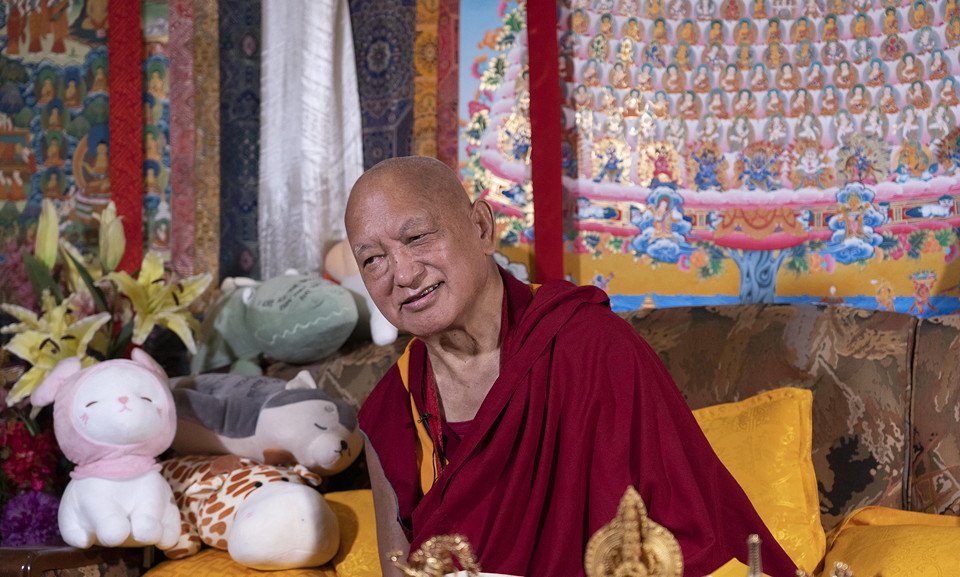
Lama Zopa Rinpoche during a video teaching on thought transformation, Kopan Monastery, Nepal, August 2021. Photo by Ven. Lobsang Sherab.
Lama Zopa Rinpoche continues his video teachings on thought transformation from Kopan Monastery in Nepal. Here is a summary of the most recent teaching:
Lama Zopa Rinpoche continues his teachings for ordained Sangha, which are open to all who wish to benefit from his advice. He explains that trying on being Sangha, like trying different foods hoping they bring you happiness, is not being real Sangha. You can enjoy wearing the robes and trying them on, but if it is just like a trip, your mind is not Sangha. If your mind is messy and not healthy, you easily give up your liberation and enlightenment.
Rinpoche then reminds us of the motivation for listening to the teachings. A perfect human rebirth—qualified by the eight freedoms and ten richnesses—is extremely rare, Rinpoche explains. It is not enough for ourselves to be free from the oceans of samsaric sufferings. The real purpose of life is to not harm others and on the basis of that to benefit the numberless sentient beings and free them from the oceans of samsaric sufferings by oneself alone. We listen to the teachings to achieve this.
As Rinpoche explained in his recent teachings, by engaging in nonvirtue, you become habituated to it and do it again. By doing this, you make your future lives sooo difficult. You know that it’s bad, but you can’t stop doing it due to past habituation. In fact, much of your behavior is due to habituation with negative karma, and due to that habituation, it becomes more and more difficult to separate from negative karma. You think only of today’s happiness, not about future lives. Your wrong concept is cheating you, causing you to drown in an ocean of attachment and anger.
The coronavirus manifests in different ways according to one’s karma. Some people have some pain and sickness, some have no symptoms, and some die. Rinpoche discusses some of the different ways the virus has manifested in people he knows, and also the possibility that he had the virus himself just with very mild symptoms. When we meet with suffering, we don’t remember karma. We can even believe killing ourselves is the solution to the pain we are experiencing. When one is having emotional problems, spirits can also harm you. Rinpoche shares some examples of people who have been harmed by spirits.
Rinpoche then reads and gives commentary on the Sutra on Having Perfect Morality. (This starts at 50:19 in the video.)
Referencing Nagarjuna in Letter to a Friend, Rinpoche reminds us again that even great pain in the human realm is nothing compared to a small suffering in the hell realm, and the suffering has to be experienced until the negative karma finishes.
Rinpoche concludes by saying that Sangha are given unbelievable freedom by being able to purify twice a month with sojong, which is the monastics’ confession day. You should think that Guru Shakyamuni Buddha is reciting sojong for you. Because we can’t see Buddha in that aspect, he recites in the form of the abbot. You see the abbot reciting it, but you should know that it is actually Buddha reciting for the Sangha. Buddha is so kind. Unbelievable, most incredible.
We invite you to go deeper into the topics presented here, plus many others, by watching Rinpoche’s video and reading the full transcript of Rinpoche’s teaching.
Watch Lama Zopa Rinpoche’s teaching “By the Force of Habituation, You Uncontrollably Engage in Nonvirtue Again“:
https://youtu.be/Tr_3KGSqTDI
- Read the transcript of Rinpoche’s teaching
- You can learn about the international FPMT community of monks and nuns by visiting the International Mahayana Institute website.
- Find Rinpoche’s Teachings on Thought Transformation translated into Spanish, Italian, French, Chinese, and Russian
- Dedication verses for COVID-19 Crisis Teachings
Watch more from the video series Lama Zopa Rinpoche’s Teachings on Thought Transformation during the Time of COVID-19 and find links to videos in transcripts, MP3s, additional practice advice, and more:
https://fpmt.org/fpmt/announcements/resources-for-coronavirus-pandemic/advice-from-lama-zopa-rinpoche-for-coronavirus/
Practice advice from our teachers, Dharma study-from-home opportunities, and more can be found on the page “Resources for the Coronavirus Pandemic.”
Lama Zopa Rinpoche is the spiritual director of the Foundation for the Preservation of Mahayana Tradition (FPMT), a Tibetan Buddhist organization dedicated to the transmission of the Mahayana Buddhist tradition and values worldwide through teaching, meditation and community service.
- Home
- News/Media
- Study & Practice
- About FPMT Education Services
- Latest News
- Programs
- New to Buddhism?
- Buddhist Mind Science: Activating Your Potential
- Heart Advice for Death and Dying
- Discovering Buddhism
- Living in the Path
- Exploring Buddhism
- FPMT Basic Program
- FPMT Masters Program
- FPMT In-Depth Meditation Training
- Maitripa College
- Lotsawa Rinchen Zangpo Translator Program
- Universal Education for Compassion & Wisdom
- Online Learning Center
- Prayers & Practice Materials
- Overview of Prayers & Practices
- Full Catalogue of Prayers & Practice Materials
- Explore Popular Topics
- Benefiting Animals
- Chenrezig Resources
- Death & Dying Resources
- Lama Chopa (Guru Puja)
- Lama Zopa Rinpoche: Compendium of Precious Instructions
- Lama Zopa Rinpoche: Life Practice Advice
- Lama Zopa Rinpoche Practice Series
- Lamrim Resources
- Mantras
- Prayer Book Updates
- Purification Practices
- Sutras
- Thought Transformation (Lojong)
- Audio Materials
- Dharma Dates – Tibetan Calendar
- Translation Services
- Publishing Services
- Teachings and Advice
- Find Teachings and Advice
- Lama Zopa Rinpoche Advice Page
- Lama Zopa Rinpoche: Compendium of Precious Instructions
- Lama Zopa Rinpoche Video Teachings
- ༧སྐྱབས་རྗེ་བཟོད་པ་རིན་པོ་ཆེ་མཆོག་ནས་སྩལ་བའི་བཀའ་སློབ་བརྙན་འཕྲིན།
- Podcasts
- Lama Yeshe Wisdom Archive
- Buddhism FAQ
- Dharma for Young People
- Resources on Holy Objects
- Ways to Offer Support
- Centers
- Affiliates Area
- Teachers
- Projects
- Charitable Projects
- Make a Donation
- Applying for Grants
- News about Projects
- Other Projects within FPMT
- Support International Office
- Projects Photo Galleries
- Give Where Most Needed
- FPMT
- Shop
Translate*
*powered by Google TranslateTranslation of pages on fpmt.org is performed by Google Translate, a third party service which FPMT has no control over. The service provides automated computer translations that are only an approximation of the websites' original content. The translations should not be considered exact and only used as a rough guide.See everyone as precious and fulfilling all your wishes.







